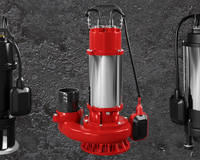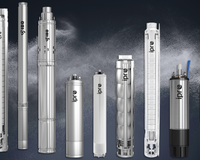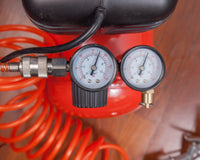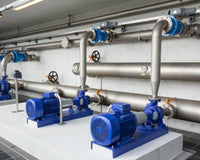Stainless steel pumps - irreplaceable in industry and agriculture
Stainless steel is currently one of the most desirable materials in the production of industrial and agricultural equipment. Its corrosion resistance, high stainless steel durability and unique stainless steel properties make it dominate the pump, tanks and water and sewage installations. Stainless steel products are used both in modern industrial plants and in farms, where the reliability of devices is crucial.
The wide application of stainless steel results from its physicochemical properties. Industrial applications of stainless steel include liquid transport systems, storage tanks, pipelines and pumps. In agriculture and application in construction, its good resistance to changing weather conditions and aggressive chemical environment is particularly valued. Thanks to this, stainless steel ideal for such applications is currently a standard in projects that require durability and safety.
Pumps made of this material are designed to work in conditions requiring high resistance. Stainless steel requires the right selection of alloys, which is why various stainless steel species are used depending on the work environment. The most common is austenitic stainless steel, ferritic stainless steel and martensitic stainless steel.
Inox - the highest quality steel in pump production
Inox stainless steel is a material that enjoys great recognition in the industrial industry. Inox is characterized by exceptional corrosion resistance and high resistance to extreme temperatures, which means that it is used in chemically aggressive environments and exposed to continuous contact with moisture. Thanks to the addition of chrome, nickel and molybdenum, it significantly increases steel resistance, and also extends its stainless steel durability.
Smooth and easy to clean the surface of stainless steel is extremely important in use in the food industry. The highest quality Inox stainless steel meets strict hygiene standards, including the HACCP standard, which allows it to be used in the production of milk, beer, drinks and other food products. Stainless steel products are also used in pharmaceutical plants, where cleanliness and resistance to aggressive chemicals are a priority.
Species and properties of steel used in pumps
The production of pumps uses various stainless steel species, selected for their purpose. Austenitic steel is most often chosen due to its plasticity of stainless steel and the austenitic structure of steel, which ensures ease of processing and welding. In places of high exposure to the effects of chemicals, however, acid -resistant stainless steel is used, including the popular AISI 316. Its chemical resistance of steel and the ability to work in a chloride environment make it irreplaceable in use in the chemical industry.
Ferritic stainless steel and ferritic steel are used where the appearance of stainless steel and its resistance to changing weather conditions, e.g. in construction, are used. In elements requiring increased mechanical strength, martensitic stainless steel is used.
AISI 304 and AISI 316 - key materials in pump production
In modern pump production, Aisi 304 is most often used - austenitic stainless steel, which is distinguished by excellent corrosion resistance and high plasticity of stainless steel. AISI 304 is widely used in the food, chemical and agriculture. Pumps made of this material can transport clean water, glycol, oils, alkaline solutions and high temperature media. Thanks to the favorable price, this is one of the most economical materials in the industry.
An alternative to this alloy is AISI 316, i.e. typical acid -resistant steel. Thanks to the addition of molybdenum, it has exceptional chemical resistance of steel and is considered as standard acid -resistant stainless steel. AISI 316 is used in chemically aggressive environments and where high resistance to extreme temperatures is required. Application in the chemical industry includes sea water desalination installations, transporting corrosive substances and wastewater treatment.
Stainless steel standards and quality
The high quality of stainless steel products results from the use of international standards. The most important is:
-
AISI standard, determining the composition and properties of steel,
-
EN 10088 standard, regulating the requirements for stainless steel in Europe,
-
DIN standard and PN standard, used in construction and industry,
-
The GOST standard, in force in the Eastern countries.
Meeting these requirements guarantees that stainless steel is formed ideal for industrial and construction applications. These standards are also crucial in projects where stainless steel durability and its reliability in long -term operation are required.
The use of stainless steel pumps in various industries
Stainless steel pumps are used in many branches of industry, agriculture and households. Industrial applications of stainless steel include the transport of food, chemical and aggressive liquids. In dairy plants, breweries and fish processing plants, stainless steel requires the fulfillment of strict sanitary standards, which is why mainly stainless inx steel stainless steel is used. Its smooth stainless steel surface prevents impurities, which is in line with the requirements of the HACCP standard.
In construction, the use in construction applies to heating and refrigeration systems. Ferritic stainless steel and ferritic steel are popular in architectural constructions due to the elegant appearance of stainless steel and stainless steel durability. In elements exposed to high mechanical loads, martensitic stainless steel is often used, whose high strength translates into many years of trouble -free operation of devices.
In agriculture, pumps made of steel, such as AISI 304 or AISI 316, are used for irrigation, drinking water transport and work in aggressive chemical conditions. Austenitic steel and austenitic stainless steel are preferred where the increased steel resistance and plasticity of stainless steel counts, enabling precise matching of pump elements.
Why is stainless steel material in the production of pumps?
Contemporary industry requirements make stainless steel considered the material of the future. Its stainless steel durability, corrosion resistance and high chemical resistance of steel allow for safe use in environments where other materials fail. Stainless steel products are distinguished by longevity, and their good mechanical resistance reduces the risk of failure and costly replacement of parts.
Modern stainless steel production allows you to create alloys tailored to specific needs. Martensitic stainless steel is irreplaceable in parts of pumps exposed to heavy loads, while ferritic and ferritic stainless steel combine a favorable price with an elegant appearance of stainless steel, which is important in devices mounted in visible places.
Austenitic stainless steel, including Aisi 304 and Aisi 316, is chosen because of its plasticity of stainless steel and the possibility of easy forming of complex pump elements. In use in construction, use in the food industry and use in the chemical industry, these species are currently a standard of quality.
By meeting the requirements such as the AISI standard, EN 10088 standard, DIN standard, PN standard or GOST standard, ideal stainless steel is formed, ready to meet the most demanding working conditions. Pumps from such steel are an investment in reliability, safety and many years of operation.
Summary
Thanks to its corrosion resistance, chemical resistance of steel and the variety of available stainless steel species, stainless pumps are the foundation of modern installations today. Stainless steel, stainless steel and technologically advanced feet, such as acid -resistant stainless steel, guarantee safety and performance in the most difficult conditions. It is stainless steel that ideal for demanding industrial applications sets a new standard of quality and durability.
The most frequently asked questions (FAQ)
Why choose stainless steel pumps?
Stainless steel pumps They stand out exceptional corrosion resistance and long life. Thanks to this, they are ideal for working in a humid and aggressive chemical environment. Stainless steel products meet international quality standards such as EN 10088 standard and The Aisi standard, which guarantees the reliability of devices in industry and agriculture.
What is the difference between Aisi 304 steel and Aisi 316?
Aisi 304 this Austenitic steel, valued for Plasticity of stainless steel And corrosion resistance in fresh water and slightly aggressive solutions. It is an economic solution, often chosen in use in the food industry and agriculture. Aisi 316, That is acid -resistant stainless steel, thanks to the addition of molybdenum Steel chemical resistance and works well in environments with high chemical aggressiveness, e.g. use in the chemical industry or in contact with sea water.
What are the benefits of Inox stainless steel in pumps?
Inox stainless steel Is The highest quality stainless and is characterized by high resistance to extreme temperatures. Addition of chromium and molybdenum increases steel resistance to corrosion and extends its service life. Smooth stainless steel surface facilitates maintaining cleanliness, which is particularly important in use in the food industry and pharmaceutical.
What stainless steel species are used in pump production?
The most commonly used are Stainless steel species such as Austenitic stainless steel, Ferritic stainless steel and martensitic stainless steel. Austenitic steel and Austenitic stainless steel They are popular because of Plasticity of stainless steel and corrosion resistance, while martensitic stainless steel It is chosen for elements requiring high mechanical strength.
In what industries are stainless steel pumps use?
Stainless steel pumps They are wide Industrial applications of stainless steel. IN use in the food industry They are used to transport milk, beer and juices. IN use in the chemical industry They are used to pump aggressive substances and sea water. Application in construction It includes heating and refrigeration systems, and in agriculture stainless pumps are used to irrigate and increase water pressure.
Where to buy iBO devices and pumps?
Our products Ibo you will buy on B2B platform. If you are a final customer, we encourage you to check ours partner stores and wholesalers. You can always contact us: +48 22 721 11 92, biuro@dambat.pl.
The information is educational. Before buying, read the product specification. Dambat - IBO pump manufacturer.







